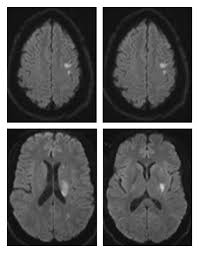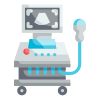MRI Head Screening With DWI
Book your MRI Head Screening With DWI at Medifyhome, where we offer top-quality scans at the best prices. Our NABL & NABH accredited diagnostic centers ensure accurate and reliable results.
Book an Appointment
MRI Head Screening With DWI
Medifyhome has collaborated with the best pathology laboratories that are NABL and NABH certified and follow ISO safety guidelines to provide the best MRI Head Screening With DWI at an affordable price for needy individuals. MRI or Magnetic Resonance Imaging is a highly effective method of imaging the inside of the brain without actually having to make an incision. The newer technique of MRI is DWI, which is a special pulse sequence that performs much better than other forms of imaging in detecting alterations in the brain tissues that are not otherwise visible on other scans. Working on the principle of Nuclear Magnetic Resonance, DWI scans can quantify the movement of water molecules in brain tissues and the results can reveal anomalies that might point to a lot of neurological disorders, often in their primary stages.
MRI Head Screening with DWI is an effective diagnostic method for identifying focused pathologies concerning acute aetiology like ischemic stroke, brain tumors, infections, traumatic brain injuries, and neurodegenerative diseases. DWI proves very useful in giving a diagnosis of a condition such as a stroke within the initial few minutes thus providing the clinician with an opportunity to modify the—patient’s outlook drastically. Such MRI screening is appropriate in patients with acute neurological deficits such as focal weakness, new visual loss, new headaches, or changes in mental status.
To schedule an appointment for MRI Head Screening With DWI, simply contact Medifyhome or call our customer care at +919100907036 or +919100907622 for more details and queries.
Why MRI Head Screening with DWI is Important?
MRI Head Screening with Diffusion-Weighted Imaging (DWI) is very important in the diagnosis of a variety of neurological conditions and offers many benefits over conventional imaging methods. The following are some of the reasons why such specialized MRI screening is crucial:
- Early Detection of Acute Conditions
DWI is very sensitive to detection of an acute ischemic stroke in a matter of minutes since the onset and usually even before other imaging techniques, such as CT scans, detect the problem. It shows where there has been a restriction of blood flow in the brain and hence the window of intervention time for recovery.
Early Detection of Neurological Disorders: DWI is of great value in detecting minor alterations that cannot be visualized, such as infections in the brain or minute lesions.
- Highly Sensitive to Changes in Tissues
Detection of Restricted Diffusion: DWI is based on observing the water molecules’ motion in brain tissue. Immediately after some damage, such as stroke or trauma, restricted diffusion happens within the affected area and can be noted in scans of DWI.
Microscopic changes: The change that happens at microscopic levels, which are not possible to identify with regular MRI or CT scans, can be identified through DWI.
- Enhanced diagnosis
DWI is very important in making the distinction between different conditions such as ischemic strokes, tumors, or abscesses. It helps doctors decide if the cause of a brain condition is restricted blood flow as in stroke or if there is swelling, infection, or abnormal tissue growth as in tumors.
It can also be used to evaluate the features of the brain tumor since tumors tend to have high cellularity that restricts water movement. This makes it easier to characterize the tumor and determine whether it is benign or malignant and hence evaluate its aggressiveness.
- Non-Invasive and Safe
No Radiation: MRI, including DWI, is a non-ionizing radiological imaging technique like CT scans or X-rays. Thus, it is a much safer option for repeated screenings, especially in the case of chronic conditions or in cases where the patient might require multiple scans.
Non-Invasive: DWI is a non-invasive technique, meaning no surgical procedure or instrument must be introduced into the body for the technique.
- Real-Time Monitoring of Brain Changes
DWI is very useful in tracking acute neurological conditions like stroke in real time by showing how the condition progresses within the brain and chronic developments like multiple sclerosis or neurodegenerative diseases, providing doctors with a basis on which they make decisions regarding appropriate treatment plans.
Monitoring Treatment Response: DWI allows the assessment of response to treatment by indicating whether the areas in question are improving, stabilizing, or worsening with time.
Conditions Diagnosed Through MRI Head Screening with DWI
MRI Head Screening with Diffusion-Weighted Imaging or DWI is a powerful imaging tool used to diagnose a whole range of neurological conditions because it can detect changes in brain tissue that are not visible under other imaging techniques. DWI is very sensitive to movement of water molecules in the brain, which makes it possible to identify abnormalities in the brain’s structure and function. Below are some of the key conditions that can be diagnosed or evaluated through this advanced imaging method:
- Acute Ischemic Stroke
- Description: Ischemic stroke occurs when blood flow to a part of the brain is blocked, leading to a lack of oxygen and nutrients to the brain tissue. DWI is the most sensitive imaging technique for identifying acute ischemic strokes, often detecting the problem within minutes of onset.
- How DWI Helps: DWI detects areas of restricted flow of water in the tissue of the brain, which reveals damage from ischemia that is a lack of supply of blood. This enables quick detection and immediate intervention to promote the restoration of blood flow that minimizes damage to the brain.
- Brain Tumors
- Description: Brain tumors are generally benign or malignant. Tumors can cause swelling, increased pressure in the brain, and displacement of the surrounding brain structures.
- The amount of brain tumors can also be known by DWI, and it detects spots by high cell density. There is less movement of molecules of water in malignant-type cancerous conditions due to much denser cellularity. Such water diffusion imaging can also give a comparison between the classes of the tumor and quantify the malignancy of such a tumor.
- TBI
- Description: Traumatic brain injury involves any damage produced in the brain due to an external force, such as hitting the head against a wall, falling, or undergoing some car accident.
- How DWI Helps: DWI can detect diffuse axonal injury (DAI), which involves damage to the brain’s white matter, and is often invisible on traditional imaging techniques like CT scans. DWI identifies microstructural changes in the brain, even in mild TBI cases, helping to assess the severity and extent of brain damage.
- Brain Infections (Abscesses, Encephalitis, Meningitis)
- Description of Infection: Brain infections, such as brain abscesses, encephalitis, and meningitis, can cause damage to the brain and result in neurological symptoms.
- How DWI Assists: DWI may help identify infected areas or the presence of an abscess, which is apparent due to restricted diffusion in the regions affected by inflammation and higher cellularity. It may be used more specifically to evaluate early and subtle changes, which would otherwise not appear on routine MRI.
- Multiple Sclerosis (MS)
- Description: Multiple sclerosis is an autoimmune disease that causes damage or permanent destruction of the myelin sheath surrounding the nerve fibers, and its progression is chronic.
- How DWI Helps: DWI may identify active lesions in the brain, particularly at the time of relapses. It is useful to monitor the extent of damage and the rate of progression over time, thereby helpful for treatment efficacy in MS patients.
Benefits of MRI Head Screening with DWI
MRI Head Screening with DWI has several advantages in the diagnosis and monitoring of neurological conditions. The following are some of the main advantages of the use of MRI Head Screening with DWI:
- Early Detection of Neurological Conditions
One of the greatest advantages of DWI is its ability to detect acute ischemic stroke early within minutes of onset. Unlike other techniques, DWI can identify brain tissue areas with restricted water movement as a result of ischemia that allows for early diagnosis and intervention with a significant positive impact on the patient’s prognosis.
Subtle Changes in Brain Tissue: DWI can detect small or subtle changes in brain tissue that are not apparently evident on conventional MRI or CT scans. This makes it very valuable in the diagnosis of early features of stroke, brain tumors, multiple sclerosis (MS), and neurodegenerative diseases before they become even worse.
- Non-Invasive and Safe
No radiation exposure. The radiation ionization of CT scans and X-rays does not exist with MRI, including DWI. MRI Head Screening with DWI, therefore, is less harmful in the case of repeated uses on the same patient, such as with monitoring over a chronic condition or with an at-risk individual for brain disorders.
Non-Invasive: This means that MRI is not an invasive technique; thereby no surgical operations are required and that there is no insertion of some instrument into the body at the time of screening.
- Highly sensitive to early ischemic changes
DWI, however, is the gold standard for detecting acute ischemic stroke. Its advantage in detecting restricted diffusion is that the area of the brain in question is identified long before any symptoms may clinically appear or be found on other imaging modalities.
Better Prognosis and Treatment Timing: Early detection of ischemic strokes through DWI allows for timely treatment, such as thrombolysis (clot-busting drugs) or mechanical thrombectomy, that can help minimize brain damage and improve chances of recovery.
- Helps Differentiate Between Conditions
DWI also detects the alteration in water flow to distinguish between tumors, abscesses, and cystic lesions. Tumors will be typically denser than other tissues, which restricts the movement of water molecules, hence visible on a DWI scan.
Differential Diagnosis of Stroke: DWI helps doctors differentiate between ischemic stroke and other neurological conditions, such as hemorrhagic strokes, brain infections, or degenerative diseases, thus making an accurate diagnosis and planning the right course of treatment.
- Monitoring Disease Progression and Response to Treatment
It may be used in monitoring neurodegenerative diseases of Alzheimer’s and Parkinson’s type as well as others. In other words, DWI provides useful data that helps indicate which brain regions are most severely affected by neurodegenerative conditions and thus allows an impression about the course of the disease.
DWI is also applied for follow-up evaluation of patients, especially when a patient is on stroke rehabilitation or chemotherapy and radiation therapy for a brain tumor.
- Test Type: MRI Head Screening With DWI
- Preparation:
- Wear a loose-fitting cloth
- Fasting not required
- Carry Your ID Proof
- Prescription is mandatory for patients with a doctor’s sign, stamp, with DMC/HMC number; as per PC-PNDT Act
- Reports Time: With in 4-6 hours
- Test Price: Rs.7000
How to book an appointment for a MRI Head Screening With DWI?
To schedule an appointment for MRI Head Screening With DWI, simply contact Medifyhome or call our customer care at +919100907036 or +919100907622 for more details and queries.
What is MRI Head Screening with Diffusion-Weighted Imaging?
MRI Head Screening with Diffusion-Weighted Imaging (DWI) is a specialized MRI technology that utilizes the movement of water molecules within the tissue to detect abnormalities. It is much more sensitive in the presence of conditions such as ischemic strokes, brain tumors, infections, and other neurological conditions. DWI can envision changes in the brain tissues that may not be apparent on conventional MRI or CT scans.
How does Diffusion-Weighted Imaging (DWI) work?
DWI measures the movement (diffusion) of water molecules in brain tissue. When brain cells are damaged, such as in stroke or infection, the diffusion of water molecules becomes restricted in the affected area, which makes these areas visible on the MRI scan. This ability to detect changes at the microscopic level allows DWI to identify issues early, even before symptoms appear.
Is MRI with DWI safe?
Generally, MRI with DWI is safe. It is a non-invasive imaging technique that doesn’t use ionizing radiation; it’s not like CT scan or X-ray. Yet, people with some implants, like pacemakers, aren’t allowed to undergo the MRI. So, report any implants or devices prior to the procedure.
What diseases can be detected with MRI Head Screening with DWI?
MRI with DWI is primarily used for the diagnosis of acute ischemic stroke, brain tumors, traumatic brain injury, brain infections (e.g., abscesses, encephalitis), multiple sclerosis, neurodegenerative diseases, and cerebral vasculitis, among others. It can detect changes in the tissue of the brain that no other imaging technique can, thus making it very useful in early detection.
How long does an MRI with DWI take?
The time range for an MRI with DWI varies from 30 minutes up to 60 minutes depending on the complexity of the scan, and areas where the imaging is being done, though additional sequences require a longer scanning time.
Is MRI with DWI an ordinary MRI scan?
Both MRI and MRI with DWI employ the same fundamental magnetic resonance technology. However, DWI is a particular sequence that involves detecting water motion within the brain environment. This enhances its utility because changes in tissue can be missed on an MRI. DWI describes more details about cellular structure in the brain and is so good at the diagnosis of stroke and conditions where the integrity of the brain was compromised.
Do I need to prepare for an MRI with DWI?
Most of the time, you will not need to prepare for an MRI with DWI. You might be asked to avoid eating and drinking for a few hours prior to the test if you need contrast material. You should wear loose, comfortable clothing, and remove any metal items before the procedure. Inform medical staff about any implants or medical devices you have.
Why Choose Medifyhome for MRI Head Screening With DWI?
Medifyhome is an online medical consultant, which offers home services not only in your city but also in all major cities of India, such as Hyderabad, Chennai, Mumbai, Kolkata and others. This makes it easy for us to work with diagnostic centers that boast of having the most accurate equipment. The customer service for booking the appointment of the services is available 24/7 and Medifyhome also comes with instructions. Medifyhome has not only the best diagnostic centres, but it offers them at very cheaper prices. If you have been tested, you can promptly schedule an appointment with a health care service through our list of skilled physicians. For appointment for MRI Head Screening With DWI, you can chat with us through Medifyhome customer care at +919100907036 or +919100907622 for more information or inquiries.





